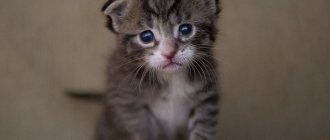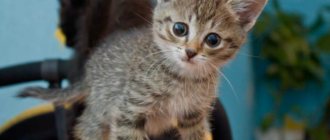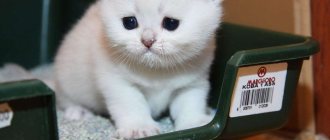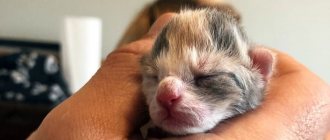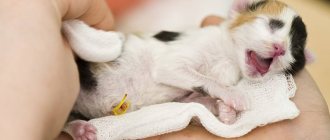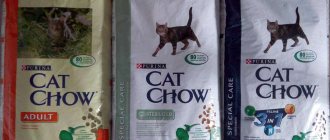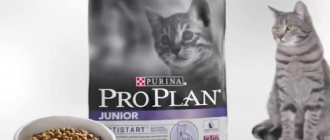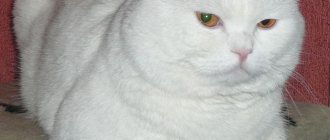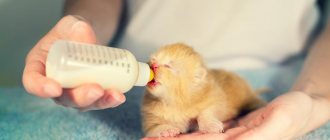Milk for kittens is a valuable, nutritious liquid that they receive from their mother. When the cat stops feeding the baby, he switches to solid food. The body reduces the production of the enzyme responsible for digesting milk. If you give your baby cow's milk instead of age-appropriate food, it may cause stomach upset.
Features of nutrition and digestion in kittens
Newborn kittens receive from mother's milk all the substances necessary for development. Cow and goat are not suitable because they do not contain the required amount of fat, protein, calories, and amino acids.
The milk that newborn kittens receive from their mother on the first day after birth not only transfers nutrients. The liquid contains antibodies that help babies fight viruses and bacteria that are dangerous specifically for cats.
A few days after birth, the amount of protein and fat in cat's milk increases. The latter contribute to the development of the nervous system of babies. Towards the end of feeding, the composition of the liquid changes, preparing the baby’s body for the transition to wet, then solid food of a carnivore.
Compatibility of milk with dry food
The cat food is balanced and provides all the necessary calcium that the cat needs in sufficient quantities. Therefore, there is no need to give dairy products to a cat if he eats only food, since the pet’s diet already contains the required amount of vitamins. In addition to it, the pet can only drink clean water.
Eating dry food and milk together can harm your cat's health. This is fraught with the development of urolithiasis, liver diseases and other organs. Therefore, when feeding dry food, it is necessary to give more water to drink and no need to give milk.
Such an everyday and simple product as milk has many nuances. But only a specific cat’s organism, which either digests lactose or not, can become an opponent of dairy products.
If you decide to pamper your little pet with this product, make sure it is fresh and of good quality, and also introduce the product gradually, observing your cat’s body.
Why cats can't have milk
Kittens grow very quickly and gain weight, so up to 12-16 weeks, food should be high-calorie and not contain components that disrupt the functioning of the digestive tract. First of all, this applies to cow and goat milk.
Lactose intolerance in cats
Dairy products contain lactose, a type of sugar that consists of glucose and galactose. It imparts sweetness to the liquid, which is an advantage of a milk drink for humans. But cats' taste buds do not respond to it.
Moreover, with age, the digestive system of pets reduces the synthesis of the lactase enzyme, which helps process lactose. Excess lactose is retained in the body, settles in the intestines and begins to interact with bacteria. Therefore, diarrhea and bloating in cats is the main sign of lactose intolerance.
Interesting fact: cat milk contains much less lactose than cow's and goat's milk - 3.4% versus 4.6%.
Milk in the diet of adult cats
Cats are carnivores, 70% of their diet should be meat, and dairy food cannot replace it. Some pets tolerate the product normally, without diarrhea or bloating. But due to the lack of necessary nutrients, there is no point in giving a milk drink to adult cats.
Cooking Features
It is necessary to pay attention to the temperature of the food. Since cold food disrupts digestion, hot food burns the oral cavity. From the first days of feeding, the temperature should be 37 degrees - an approximate indicator for the kitten’s body.
Lower this level every week. By the end of the month, the mixture should be at room temperature - 24 degrees. If there is nothing to measure, proceed as follows. The bottle is pressed against the bend of the elbow, nothing is felt - neither cold nor heat - you can give it to the kitten.
Calculation of the amount of mixture
You need to get a measuring spoon to properly prepare food for newborns. The amount of feed is calculated taking into account body weight.
- Days 1–4 – 30 ml of the prepared mixture per 100 g of weight;
- 5 –13 – 38 ml;
- 14 –24 – 46 ml;
- 25 –35 – 53 ml per 130 g body weight.
Can cats be given milk?
Do kittens get milk? Older babies who have switched to wet and solid food should not be given cow's or goat's milk. This usually happens by 8-10 weeks. Cats will not refuse dairy food, since the memory of the “taste of childhood” remains on the subconscious level.
Can kittens have cow's milk?
The maximum fat content of cat's milk is 10%, cow's milk is 3.6%. Can a small kitten be given cow's milk? No. It is unable to replace mother’s milk for a newborn, and is not needed for older pets. Moreover, the product cannot be given as the main food.
Cow's milk may not provide all the nutrients needed to keep your pet healthy. The fat present in the liquid contributes to weight gain and stomach upset in an adult cat. The low-fat product does not contain vitamins A and D, which help calcium and protein to be absorbed. This has a bad effect on the skeletal system.
Can kittens have goat milk?
Goat product contains more minerals and vitamins than cow product. It is fattier than cow's milk (6%), but this is not enough for a kitten. Goat milk has a little less lactose, so it is absorbed a little better than cow milk. However, once the kittens are on solid food, milk should be stopped.
The veterinarian can recommend a product for feeding a newborn kitten, giving a recipe for preparing the mixture. It is not recommended to give it in its pure form, since it does not contain many substances necessary for the normal development of the pet.
Can a kitten have milk from the store?
Is it possible to give a kitten store-bought milk? No. Mostly cow milk is sold in supermarkets and is not suitable for pets. Pasteurized products are especially harmful to cats. Studies have shown that it causes skeletal abnormalities, developmental defects and reproductive problems.
Moreover, do not buy cheap goods. Usually this is a low-quality product, where 2-3 tablespoons of dry powder are diluted with a liter of water, and there is not even a smell. A newborn will not benefit, and a grown pet will not need such food.
Can a kitten have powdered milk?
Pet stores sell dry food - cat milk substitutes. They can be given to kittens up to 8 weeks old if they are left without a mother or there is not enough milk. If there is no substitute on sale, the situation is critical; regular milk powder cannot be given. Call your veterinarian, who will tell you exactly how to prepare a formula for your newborn pet.
Fermented milk products in the diet of cats
If adult cats do not digest milk, what can you do to pamper the cats? Surprisingly, fermented milk products are absorbed by cats much better than dairy products.
Sour milk contains enzymes that help the gastrointestinal tract function properly. Therefore, you can try giving your pet kefir, fermented baked milk, and cottage cheese. Fermented milk products can harm an adult cat in less quantities than kittens.
Pet owners should remember that fresh kefir has a laxative effect, and kefir that is older than 2 days, on the contrary, strengthens it. It can be difficult to persuade an adult cat to eat kefir, because it is sour, and cats are unlikely to have a great desire to consume it.
Is it possible for a purebred fold-eared kitten to have fermented milk products?
Many experts believe that it is better not to give fermented milk products to kittens at all, as they can cause increased gas formation and bloating in the kitten, and there is a high likelihood of intestinal disorders.
What and how to feed a small kitten
If you picked up a kitten on the street or the cat does not have milk, the ideal option is to find a wet-nurse cat. To do this, ask your friends, advertise on social networks.
What kind of milk should be given to newborn kittens if a wet nurse has not been found? Buy kitten replacement from your veterinary pharmacy, which can be sold in liquid or dry form.
When a substitute is not sold in your city, ask your veterinarian how to prepare formula for feeding a kitten and what kind of milk to feed the kitten. You cannot feed your baby regular cow or goat milk; it must be mixed with yolk. Moreover, do not give condensed milk, the composition of which leaves much to be desired.
How to feed a newborn kitten
The pet must be fed from a special bottle with a nipple, which can be purchased at a pet pharmacy. If it is not there, you can take a pipette or syringe without a needle. In the second case, the mixture must be squeezed out slowly, otherwise the liquid may enter the trachea.
How much milk to give a kitten
A newborn kitten needs to be fed every 2 hours. You need to give:
- 2-3 ml of mixture per 1 feeding in the first three days of life;
- from days 4 to 7, the dose should be increased to 5 ml;
- at the age of 6-10 days – 5-7.5 ml.
Then the frequency of feedings decreases:
- from 11-14 days they give 10-12.5 mixtures, feeding every three hours.
- from 15-21 days – 10 ml of the mixture 8 times a day.
- from 21 days, give 7.5-25 ml 3-4 times a day, begin to introduce solid food.
Feeding instructions
- Dilute the mixture according to the instructions, heat in a water bath.
- Place a cloth on your knees, place the baby on his stomach, slightly raise his head.
- Give him a pacifier with a bottle.
- If you take the pacifier away prematurely, the baby will crawl and squeak. When he is full, he turns his face away and falls asleep.
- After feeding, remove any remaining food from the baby's fur.
- Place your pet on its back and stroke its tummy to start the process of digesting food.
- To avoid constipation and stimulate peristalsis, massage the kitten’s tummy and anus. If it doesn’t help, you can give an enema, but for the first time ask to do it yourself.
Blend recipes
Preparing food for kittens is quite simple. The main ingredient is, of course, milk. Auxiliary ones are added to it.
Recipe 1
Cow or goat milk is mixed with egg yolk in a 4:1 ratio. Beat well until smooth.
Recipe 2
The most nutritious, healthy mixture for kittens is prepared from several ingredients. Add 15 g of dry yeast and 2.5 g of dry yeast to 50 ml of cow's milk. Separately, beat the chicken egg until foamy. Combine with the mixture. Add 1 g of vegetable oil, 4 g of sugar.
Recipe 3
Mix 50 ml of raw, boiled milk, add half the yolk, 1 teaspoon of corn oil.
Recipe 4
200 ml of milk mixed with yolk, 0.5 tsp. vegetable oil, 20 ml glucose, 2 teaspoons of infant formula.
Recipe 5
Add whipped yolk to 500 ml of milk.
Question answer
Is it possible to give a one-month-old kitten milk from a non-cat?
There is no point if the mother has enough of it. If your baby is hungry, buy a formula designed for kittens.
Why can't cats be given milk?
The product contains lactose, which the cat's body does not digest well. The result of such feeding is diarrhea, bloating, allergies.
What kind of milk can you give a kitten?
If your baby has already switched to solid food, do not give him a milk drink.
Is it possible to feed a kitten milk?
No. If you have a newborn kitten without a mother, it is better to buy a cat milk replacer.
Should a nursing cat be given milk drinks?
No. It is better to give vitamins and minerals that veterinarians recommend for pregnant and lactating cats.
Options for replacement
Currently, many different milk replacers are produced, designed for pets of different breeds and ages. And every responsible cat owner should know how to replace milk if necessary. So, if a cat has an allergy or intolerance to this product, the following will come to the rescue:
- fermented milk products;
- infant formula diluted with water;
- a special balanced dairy product substitute that does not contain lactose, intended for cats with sensitive digestion. Currently offered by brands such as Beaphar (Kitty Milk), Gimpet (Cat Milk), Royal Canin (Babycat Milk).
Thus, the opinion of most veterinarians is that mustachioed pets are not prohibited from feeding low-fat milk if it is normally absorbed by the body. Cats with intolerance to it can be treated to fermented milk products, again, provided that their perception is normal. But in no case is it allowed to mix dairy products with ready-made feed.
What to feed a 1.5 month old kitten
At 1.5 months, the kitten can already eat on its own. The weight of the animal can range from 500 to 700 grams. At this time, the kitten needs a complete diet. If the baby is fed natural food, the owner should take care of the variety of food. At one and a half months of age, kittens can be fed the same foods as at four weeks, but gradually new foods can be included in the kitten’s diet:
- porridge from buckwheat, rolled oats (without salt and sugar);
- boiled vegetables (cabbage, carrots, broccoli, zucchini, etc.);
- raw meat (veal, lamb, turkey, chicken, etc.);
- offal, raw or boiled (chicken liver, heart, lungs);
- cottage cheese (fat content no more than 9%) 30 g per day;
- raw fish, scalded with boiling water (without bones, scales, etc.) once a week;
- specially grown greens (you can grow it yourself or buy it at a pet store).
When my cat was little, I fed him oatmeal mixed with wet kitten food, or just boiled meat, or chicken, or fish. Once a week it is recommended to give cats liver and eggs. I bought vitamins from DoctorZOO for kittens. He also very often received leftover baby purees (vegetables and meat), cottage cheese, etc.
Tigrasha, forum user
https://forum.say7.info/topic1753.html
The kitten's menu should expand every month
Feeding frequency
A one and a half month old kitten can be fed 5-6 times a day. The daily amount of food should be about 120 grams per day. Some kittens do not eat all the food offered at one time; this cannot be ignored. It may be difficult for the animal to switch to infrequent feedings. This way he will remain half-starved. If you begin to feed the kitten less often, then the portions should be larger.
Your pet may eat less than 120 grams per day, this may be due to the fact that he does not like the food. There is still a possibility that the baby is sick. Consult your veterinarian; frequent refusals to eat indicate poor appetite.
Closer to 2 months, the volume of the daily diet can be increased to 160–180 grams. But here it all depends on the kitten itself. There are more active kids who constantly play and frolic. Such kittens will eat more than their calm brothers.
It is also important what time of day you feed your pet. There are people who go to work in the morning and come late in the evening. This does not mean that you need to feed the baby in the morning and postpone the next meal until the evening. During one dinner, a kitten will not be able to eat all the food allotted to it at once, and saving part of dinner for a night meal threatens to overeat. In such cases, you can feed the kitten in the morning, leave some of the food in a bowl (it will be eaten closer to lunch), and feed it dinner in the evening. In addition, you can ask your neighbors to come in and feed the cat after lunch.
You need to make sure that the kitten does not remain hungry or overeat
Vitamins and supplements
Natural feeding of small kittens may require vitamins. There are vitamin supplements that are designed for kittens from one and a half months of age:
- "Doctor Zoo";
- "Farmavit";
- Kitzim;
- "Biofar";
- "Brevers", etc.
The owner of a kitten should not run to the veterinary pharmacy and immediately buy all the supplements that will be offered to him. First, it is advisable to consult a veterinarian. Specialists are better versed in the world of veterinary drugs. Perhaps your cat already has enough vitamins, but consuming them in excess can lead to hypervitaminosis. And secondly, you need to carefully study the instructions for the vitamin supplement. Some cat breeders make the mistake of buying 2 different supplements with a similar composition. If you decide to purchase at least 2 drugs, then you need to make sure that their components are not repeated.
In general, the instructions for use describe in detail the indications and contraindications for use. The packaging also indicates why certain vitamins are needed. The most common vitamin supplement given to kittens is fish oil. Breeders recommend giving it to animals 2 capsules per week. If fish oil is purchased in capsules, the liquid can be added to food by piercing the capsule shell with a needle.
In pet stores you can buy special treats for kittens with vitamin supplements.
The mistake is made by those cat breeders who try to saturate the animal’s body with vitamins from individual products. For example, I know a family who feed small kittens (up to 2 months) fresh sprat. Allegedly, this fish contains phosphorus, which is so beneficial for animals. In fact, excess phosphorus leads to the deposition of kidney stones. It is precisely because of the risk of developing urolithiasis that cats and kittens are not recommended to abuse fish at all. In addition, a veterinarian I know told me that fish contains an enzyme that can decompose vitamin B1 (thiamine).
What a kitten shouldn't eat
There are some foods that should not be fed to kittens of any age:
- ready-made food from the table (it may contain salt, spices, etc.);
- medicines and vitamin preparations for people;
- sweets (accumulates in the blood);
- pork and lamb (meat is too fatty and can also be infected with parasites);
- river fish (lots of bones, there is a risk of infection with parasites);
- bones (the kitten can seriously damage the esophagus or stomach);
- legumes (not digested);
- potatoes (not digested, causing fermentation, and also have too much starch);
- fatty fermented milk products (including cheese);
- flour.
The danger is that small kittens can beg for a long time and persistently. It can be very difficult to resist such pressure. For example, when my cat was little, she skillfully begged for ice cream. Of course, you can’t pamper kittens with such “goodies” - they’re too fatty and sweet. In addition, various artificial ingredients are now added to ice cream.
Loving owners sometimes spoil their kittens with ice cream, but this is very dangerous.
Feeding kittens
In order for babies to develop normally, they need a proper diet with the obligatory presence of vitamins. To create mixtures for kittens, you should get a small measuring cup. You also need to know how much weight of a particular component a teaspoon or tablespoon can hold. This knowledge will be useful when preparing mixtures.
All kitten formula recipes include dairy products. At best, food that replaces cat milk is purchased at pharmacies and pet stores. However, this option is not always suitable for everyone. Therefore, people use self-created mixtures to feed kittens.
To create a milk formula for a kitten, goat's milk with a fat content of up to 2.5% or cow's milk - 1.5% is often used. Once every 2 days, you can add the yolk of quail eggs and 2-3 drops of syrup consisting of 1 teaspoon of water and 1 teaspoon of sugar to the milk.
When the kittens open their eyes, they should be given any meat mixture intended for human children. At first, it replaces one milk feeding. A day later another one and so on.
The meat mixture (2.5 ml) should be diluted with one teaspoon of water, stirring until it becomes liquid sour cream. Kittens are fed through a syringe or pacifier. The solution is stored in the refrigerator for 24 hours.
In what cases are newborn blind kittens left without a mother-nurse?
In what cases does the question arise, how to feed newborn kittens without a cat?
Sometimes it happens that a cat dies during childbirth or immediately after it.
It happens that for some reason she refuses to feed her offspring.
And sometimes the soulless owners of their four-legged pet can simply throw the offspring outside so as not to violate their comfort zone.
In any case, orphaned kittens can be saved, even if it is not possible to find a nursing cat and give her sucklings.
A wet nurse is, of course, an ideal option, but such an opportunity is not always available.
Caring for newborn kittens requires patience and some knowledge
The main thing is to properly ensure their maintenance. And this:
- arrangement of a cozy “nest” with heating;
- providing nutrition equivalent to mother's milk;
- proper care for babies, taking into account their physiological needs.
Temperature and dose of milk
Depending on its size, the kitten is given approximately 2.5 milliliters of the mixture, adding half a milliliter evenly after two feedings. After three days, the baby is able to drink up to 10 milliliters of milk. The temperature of the mixture should not exceed 38-39°C. That is, the mixture should not be hot, nor should it be cold. You can check whether the formula is suitable for feeding a kitten by dropping it on your wrist. The warm mixture does not burn.
Often, when feeding, they adhere to the following regimen, depending on age: - 1 week - approximately 30 milliliters per 100 grams of weight; - at 2 weeks 35 milliliters per 100 grams of weight is given; - at 3 weeks the norm is 40 milliliters per 100 grams of weight; - from 4 weeks - ranging from 48 to 53 milliliters per 100 grams of weight.
All the arguments for and against
It is impossible to say unequivocally whether milk will be beneficial for a particular cat. It all depends on the individual characteristics of the body, as well as on the usual diet. Milk does not go well with some foods; consuming them at the same time will inevitably lead to indigestion, even in absolutely healthy pets. You should not give milk and fermented milk products when feeding special cat food.
You need to give the animal natural products - country products, not purchased on store shelves or supermarkets. Their composition is far from natural products, the beneficial properties are reduced or completely absent. If the animal’s body does not tolerate cow’s milk, you can try goat’s or sheep’s milk. If there are unpleasant manifestations in this case, the product should be discarded. The situation is similar with sour milk. The main argument is why you can’t give milk to a cat, lactose intolerance, fat intolerance. If the body easily copes with the components, there are no prohibitions.
Content of essential substances in milk
| Content of essential substances in milk | goat | cow |
| Protein (g) | 3,1 | 3,2 |
| Fat (g) | 3,5 | 3,9 |
| Vitamin A | 39 | 21 |
| Vitamin B1 | 68 | 45 |
| Riboflavin | 210 | 159 |
| Vitamin C (mg ascorbic acid / 100 ml) | 2,1 | 2 |
| Vitamin D | 0.7 | 0.7 |
| Calcium | 0,19 | 0,18 |
| Iron | 0,07 | 0,06 |
| Phosphorus | 0,27 | 0,23 |
| Cholesterol (mg/100 ml) | 10 | 14 |
| Sugars (lactose) | 4,4 | 4,8 |
| Saturated fatty acids (g) | 2,3 | 2,4 |
| Monounsaturated fatty acids (g) | 0.8 | 1,1 |
| Polyunsaturated fatty acids (g) | 0,1 | 0,1 |
It should be noted that the data given are averages, since the composition of milk greatly depends on the breed of animals, the conditions of their keeping, diet and a number of other factors.
Preparing a place for keeping kittens
Under normal conditions, the cat independently provides its babies with the optimal temperature regime.
She warms the little kittens who are with her all the time.
Considering that the physiological norm for a cat’s body temperature is 38 degrees, when arranging a place for babies, it is important to take into account that in the nest it should be a little higher.
An electric or simple heating pad is suitable for heating; an infrared heater is perfect.
You can also use plastic bottles with warm water.
Of course, the water in a simple heating pad or bottle will have to be changed frequently.
But this will not be difficult, because small kittens have to be fed several times a day.
This way it will be easy to control the temperature.
It is best to wrap the bottle in a towel or terry cloth.
It is best to cover the nest with soft, non-synthetic fabric or baby diapers, which, unlike fabric, do not need to be washed.
When choosing between a cardboard box and a basin, it is better to choose a basin: a cardboard box can get wet and absorb odors.
Therefore, keeping small kittens in a basin or plastic box will be more hygienic.
carrying bag is also suitable for this purpose .
Houses for cats will also come in handy , only later: caring for orphaned kittens up to one month of age is not entirely convenient in them.
